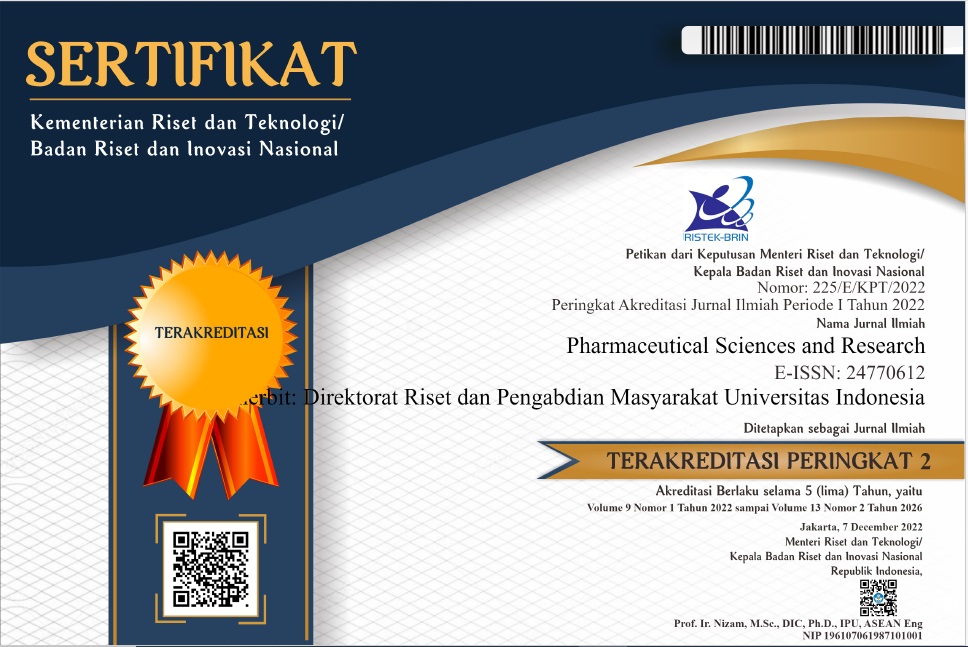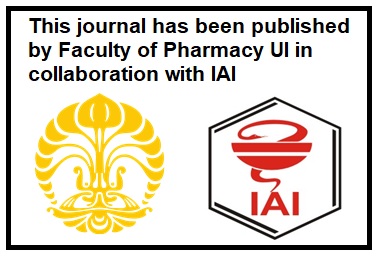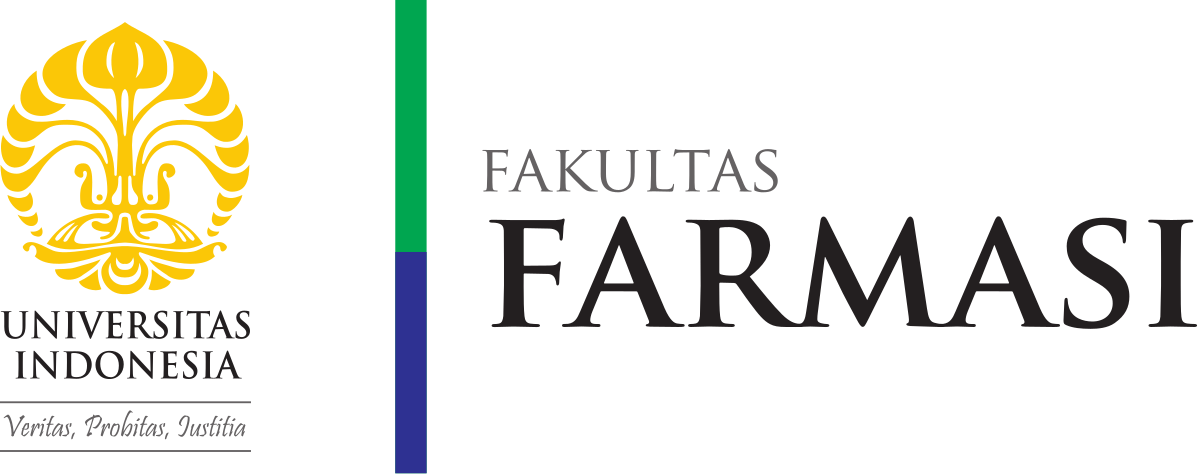Abstract
In 2022, Indonesia experienced a public health crisis involving acute kidney failure in children, traced to paracetamol syrup contaminated with ethylene glycol and diethylene glycol. This underscores the urgent need for safer antipyretic alternatives. This study investigates the antipyretic potential of transdermal patches formulated with ethanol extract of water hyacinth (Eichhornia crassipes) leaves sourced from Srandakan, Bantul, Yogyakarta. Extract concentrations of 0.8%, 1.0%, and 1.2% were tested, alongside a negative control (no extract) and a positive control (paracetamol). The patches underwent evaluations for organoleptic properties, weight uniformity (0.41±0.02 to 0.52±0.02 g), thickness (0.36±0.03 to 0.41±0.03 mm), water absorption (5.95%±0.04 to 17.45%±0.04), folding endurance (all >300 times), and pH (4.05±0.03 to 4.20±0.04). Antipyretic activity was assessed in vivo using Wistar rats. The 1.2% extract patch (F3) showed a temperature reduction of 57.45±14.31% at 180 minutes, while paracetamol achieved 74.07±11.38%. Although paracetamol showed greater efficacy, the extract patch acted faster. Both paracetamol and extract patch were statistically significant compared to placebo (p<0.001). Although paracetamol exhibited a stronger antipyretic effect than the extract patch, this difference was not statistically significant (p=0.847). These findings support the further development of the water hyacinth extract patch as a promising antipyretic alternative, with potential improvements through the enhancement of the formulation and the development of a slow-release system.
References
Aronoff, D. M., & Neilson, E. G. (2001). Antipyretics: mechanisms of action and clinical use in fever suppression. The American Journal of Medicine, 111(4), 304-315.
Balaji, P., Thirumal, M., Gowri, R., Divya, V., & Vadivelan, R. (2012). Design and evaluation of matrix type of transdermal patches of methotrexate. International Journal of Pharmaceutical, Chemical and Biological Sciences, 2(4), 464–471
BPOM. (2022). Guidelines for risk mitigation of Ethylene Glycol (EG) and Diethylene Contaminants Glycol (DEG) in processed food. Food and Drug Administration of the Republic of Indonesia.
Dasopang, E. S., Zebua, N. F., & Julianty, S. M. (2023). Using Medicine safely in Sumber Karya Village, East Binjai District. 2(1), 94–98
Elfiyani, R., Nining, N., & Dwicahya, A. M. (2023). Characteristics of domperidone patch with variation of penetration enhancers (Isopropyl Myristate or Eucalyptus Oil). Indonesian Journal of Pharmaceutical Science and Technology, SUPP 5(2), 188-195.
Keurentjes, A. J., & Maibach, H. I. (2019). Percutaneous penetration of drugs applied in transdermal delivery systems: an in vivo based approach for evaluating computer generated penetration models. Regulatory Toxicology and Pharmacology : RTP, 108, 104428. https://doi.org/10.1016/j.yrtph.2019.104428
Kim, S., Youssef, S. H., Lee, K. M. K., Song, Y., Vaidya, S., & Garg, S. (2024). Enhanced skin permeation of 5-fluorouracil through drug-in-adhesive topical patches. Pharmaceutics, 16(3), 379. https://doi.org/10.3390/pharmaceutics16030379
Lahon, D., Sahariah, D., Debnath, J., Nath, N., Meraj, G., Farooq, M., Kanga, S., Singh, S. K., & Chand, K. (2023). Growth of water hyacinth biomass and its impact on the floristic composition of aquatic plants in a wetland ecosystem of the Brahmaputra floodplain of Assam, India. PeerJ, 11, e14811. https://doi.org/10.7717/peerj.14811
Madhulatha, A., & Naga, T.R. (2013). Formulation and evaluation of ibuprofen transdermal patches. International Journal of Research In Pharmaceutical and Biomedical Sciences, 4 (1).
Mujeeb, F., Bajpai, P., & Pathak, N. (2014). Phytochemical evaluation, antimicrobial activity, and determination of bioactive components from leaves of Aegle marmelos. BioMed Research International, 2014, 497606. https://doi.org/10.1155/2014/497606
Prakash, C., Bhargava, P., Tiwari, S., Majumdar, B., & Bhargava, R. K. (2017). Skin surface pH in acne vulgaris: Insights from an observational study and review of the literature. The Journal of Clinical and Aesthetic Dermatology, 10(7), 33.
Rajesh, B., Nair, S. S., Rajesh, B., & Nair Sr, S. S. (2023). Antioxidant and cytotoxic effects of the methanolic extract of Eichhornia crassipes petioles upon mg-63 cell lines: An in vitro study. Cureus, 15(5).
Rorong, J. A., & Suryanto, E. (2019). Analisis fitokimia enceng gondok (Eichhornia crassipes) dan efeknya sebagai agen photoreduksi Fe3+. Chemistry Progress, 3(1), 33-41.
Sahu, K., Pathan, S., Khatri, K., Upmanyu, N., & Shilpi, S. (2021). Development, characterization, in vitro and ex vivo evaluation of antiemetic transdermal patches of ondansetron hydrochloride and dexamethasone. GSC Biological and Pharmaceutical Sciences, 14, 067-078.
Shirsand, S.B., Ladhane, G.M., Prathap, S., & Prakash, Shraim, A. M., Ahmed, T. A., Rahman, M. M., & Hijji, Syaputri, F. N., Bethasari, M., & Triana, A. M. (2024). Pengaruh perbedaan konsentrasi polimer HPMC pada sediaan patch transdermal ekstrak buah stroberi (Fragaria vesca L.). FARMASIS: Jurnal Sains Farmasi, 5(1), 10-22.
Shraim, A. M., Ahmed, T. A., Rahman, M. M., & Hijji, Y. M. (2021). Determination of total flavonoid content by aluminum chloride assay: A critical evaluation. LWT, 150. https://doi.org/10.1016/j.lwt.2021.111932
Ulfa, M., Fatmawaty, A., & Dambur, A. M. (2023). Anti-acne patch formulation silkworm cocoon waste with HPMC and PVP variations. Indonesian Journal of Pharmaceutical Science and Technology, 10(3), 147-153.
Zhang, Z., Qin, L., Peng, L., Zhang, Q., Wang, Q., Lu, Z., & Gao, X. (2016). Pharmacokinetic-pharmacodynamic modeling to study the antipyretic effect of qingkailing injection on pyrexia model rats. Molecules, 21(3), 317.
Recommended Citation
Niswara, Anggita Kamalia; Kusrinanti, Nabillah Ainun; Firdaus, Rizqi Amalia; and Ikhsanudin, Azis
(2024)
"Utilizing Water Hyacinth (Eichhornia crassipes) from Srandakan Bantul, Indonesia for ‘Bright Fever Patch’ as an Alternative Children’s Fever Therapy,"
Pharmaceutical Sciences and Research: Vol. 11:
No.
3, Article 5.
DOI: 10.7454/psr.v11i3.1344
Available at:
https://scholarhub.ui.ac.id/psr/vol11/iss3/5
Included in
Natural Products Chemistry and Pharmacognosy Commons, Other Pharmacy and Pharmaceutical Sciences Commons, Pharmaceutics and Drug Design Commons








